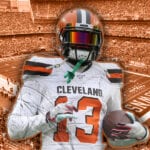With the season coming to a close on Wednesday, 16 teams are preparing for the playoffs while the other 14 teams are going home. Of the 14 teams left out of the postseason dance, some are left heartbroken after coming up short, while others are just happy with the progress their teams made throughout the year. Players on these teams often go unrecognized as a result of their team’s lack of success, which just isn’t fair. Players like Kevin Love in his Timberwolves days, and Demarcus Cousins in his Kings days would consistently put up huge stat lines without playing any playoff games, so in their honor we shall recognize the winners of the non-playoff team end of the year awards.
Most Valuable Player: Anthony Davis
Every season since Davis’ first and only playoff appearance in 2015, people around the NBA have expected him to take the next step as a superstar. Individually, he has taken that step, as he averaged 28 points, 11.8 rebounds, 2.2 blocks, and 1.3 steals per game this season.
Without context, that is an absolutely elite season that would make Davis an MVP candidate easily. With context, however, you recognize that his team only won 34 games, which makes it incredibly difficult to even include him in the top 5 of the MVP voting. Lucky for Davis, however, winning is not a requirement in these awards, and his elite numbers make him the easy choice for MVP of the non-playoff teams.
Coach of the Year: Erik Spoelstra
After starting 10-31, the Heat completely turned their season around and finished the year 30-11, ending with a 41-41 record. They were the biggest feel-good story of the second half of the season, and many thought they deserved a playoff spot for how hard they fought, but in the end they came up one game short.
Even though the team is probably feeling pretty down on themselves, they still have a lot to be proud of, and none of it would have been possible without Erik Spoelstra leading the way. Spoelstra was able to develop his young and inexperienced cast of players so well that the team finished with eight players averaging double-digit points, which led the league.
Most teams would have thrown in the towel mid way through the season and decided to tank for a good draft pick, but Spoelstra believed in his team. He knew that his team could make the playoffs no matter what, and even though they came up short their valiant effort should not go unrecognized.
Most Improved Player: Nikola Jokic
For the most of the year, the Nuggets held onto the eight seed in the West. Jokic was the biggest reason the team had such success. After coming on the scene last year as a surprise member of the All-Rookie First Team, he built on that and took his game to a whole new level. In the last 41 games he played this season, he averaged 19.7 points, 11.5 rebounds, and 5.8 assists per game while shooting 58% from the field.
His offensive talent is unmatched by any big man in the league because of his elite passing ability for a player his size. He can score from anywhere on the court, and when he is doubled he almost always makes the right play to find the open teammate. Similar to the Heat, his Nuggets finished one game back of the playoffs, but his team was projected to be at the bottom of the table before Jokic took the step forward he did this season.
What is also incredibly impressive is Jokic’s offensive rating of 126, demonstrating that the Nuggets with him on the court had one of the best offenses in the entire league. Moving forward, the Nuggets have found their cornerstone to build around.
Defensive Player of the Year: Anthony Davis
Yes, Anthony Davis is walking away with two awards in this ceremony. Davis not only had the tremendous offensive year that got him the MVP, but his defensive dominance is also on a whole other level. He was second in the NBA in blocks per game at 2.2, and was seventh among power forwards and centers in steals at 1.3 per game.
Looking into the deeper individual defensive numbers is when his dominance becomes obvious. With Davis as the defender, players shoot 6.3% worse from the field, and only 41.5% total. In the paint, players shoot 7.7% worse as well, showing his ability to be an elite rim protector. His defensive rating is 102 as well, showing that even though his team may not be very good around him, teams still struggle to score when he is on the court.
Overall, Davis should one day win this award for real as long as he can help his team win a few more games in the future. For now, however, this made up award should make due.
Sixth Man of the Year: James Johnson
I already discussed the turnaround of the Miami Heat, but besides Coach Spoelstra, Johnson helped right the ship midway through the year as well. He did a little bit of everything when he subbed into the game, as his numbers show. He averaged 12.8 points, 3.6 assists, 4.9 rebounds, 1.1 blocks, and 1.0 steals per game, showing his multifaceted ability.
He also contributes in a lot of ways that don’t show up in the box score. His willingness to accept any role he is put into makes things a lot easier for the rest of the team. He can guard practically any position on the court to a certain extent, and he is very unselfish about his contributions. He is always willing to do what’s best for the team before what’s best for himself, and that is why he has finally broken out into a solid role player in the league this year.








